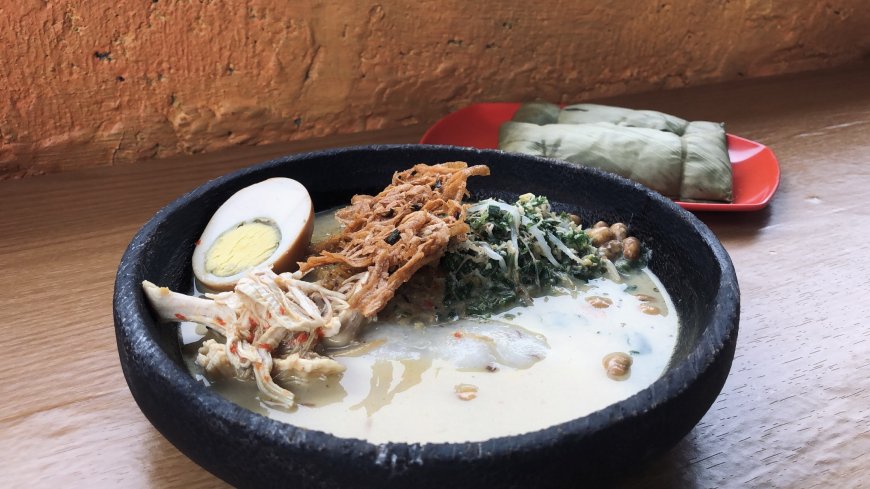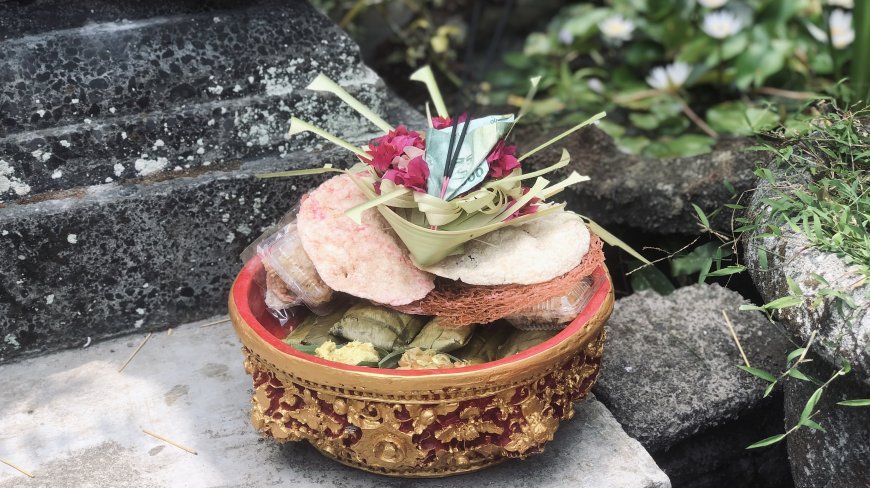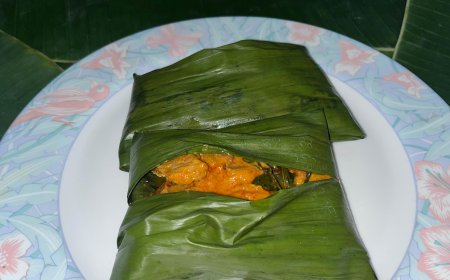Entil Pupuan, Traditional Food Rich in Philosophy Becomes a Souvenir of Ancestors during Rahina Ulihan?
Ulihan, a special Balinese holy day, is believed to be the time when the ancestors "return home". In Pupuan Village, the community does something unique by creating a special dish that is considered as a "fruit of the hand" for their ancestors. Having a glimpse of ketupat and a porridge-like presentation does not diminish the uniqueness of this dish. The dish is made from leaves and tied with a rope that can only be found in the Pupuan Region.
Ever heard of Rahina Ulihan? It's a Balinese holy day that is believed to be the time when the ancestors "return home". On this holy day, there is a unique thing done by people who live in Pupuan Village, Pupuan District, Tabanan Regency. They serve a food that is only made once every six months. It is said that this food is a "souvenir" that will be given to their ancestors who return at that time. Culinary friends may know what food is meant?
Entil is a traditional food that can only be found in Pupuan District, Tabanan. This special dish has a deep philosophical meaning. The word "entil" or "entel" comes from the Balinese Language, specifically "kentel" which means "firm" or "solid". So, Entil is a symbolization of the strengthening of grace before the ancestors return during Rahina Ulihan. The returning ancestor is given offerings, with the hope that "ida" will give the gift back, to the people who make the offerings.
In the making one "takep" or "bungkul" Entil consists of two blades wrapped or tied together with a rope. Why is this? This symbolizes the spirit within, or as the Balinese know it, Sang Hyang Numadi. Balinese people believe that each individual has two types of spirits in pairs, namely "male" and "female". This concept is reflected in the process of making Entil, where two blades are combined into one, depicting the unity and balance between the "male" and "female" spirits within each person. In its presentation at the Ulihan "banten" in Pupuan, the entil functions similarly to a ketupat. Thus, there must be 6 blades or 3 pairs (akelan).
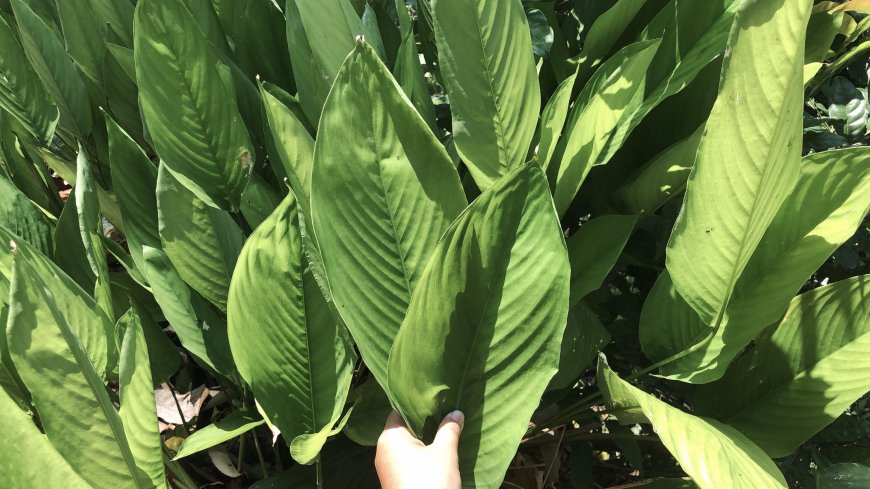
Kalingidi Leaf (Source: Private Collection)
At first glance, Entil does have a similar appearance to the ketupat or lontong that we are generally familiar. Although at first glance, Entil looks similar to lontong made from rice, in terms of size and shape it is relatively small and slightly flattened. In fact, in some other areas of Bali, there are similar dishes to Entil that are also used as offerings at Rahina Ulihan. However, the dish has a different preparation method and name. For example, in North Bali there is tipat pesor and also tipat blayag. So, what makes this Entil different from the others?
Entil is unique in its presentation, using a leaf that can only be found in Pupuan village, known as kalingidi leaf. This leaf was originally a wild plant found on the slopes of Mount Batukaru. Although it has an ordinary appearance similar to turmeric leaves, kalingidi actually has its own meaning. The word kalingidi can be decomposed into two syllables, namely "kali" and "ngidi". "kali" or "kala" in Balinese refers to time. Meanwhile, "ngidi" or "ngid" refers to "tanekan" or sediment, which can be interpreted as leaving a gift. Thus, kalingidi describes the moment or time when ancestors return to Rahina Ulihan by leaving behind boons.
Not only that, the rope used to wrap the Entil can only be found in Pupuan Village, namely kaso-kaso rope. Kaso-kaso comes from the word "kasa" which means white. However, the dialect pronunciation of the people of Pupuan Village often replaces the suffix "a" with "o" to form the word "kaso". In this context, the white color of the kaso-kaso rope symbolizes purity. Thus, entil can be philosophized as two blades of male and female within which are then combined and tied with purity. As a symbol of offering purity during Rahina Ulihan. With the hope that the ancestors will return to give the same gift of purity.

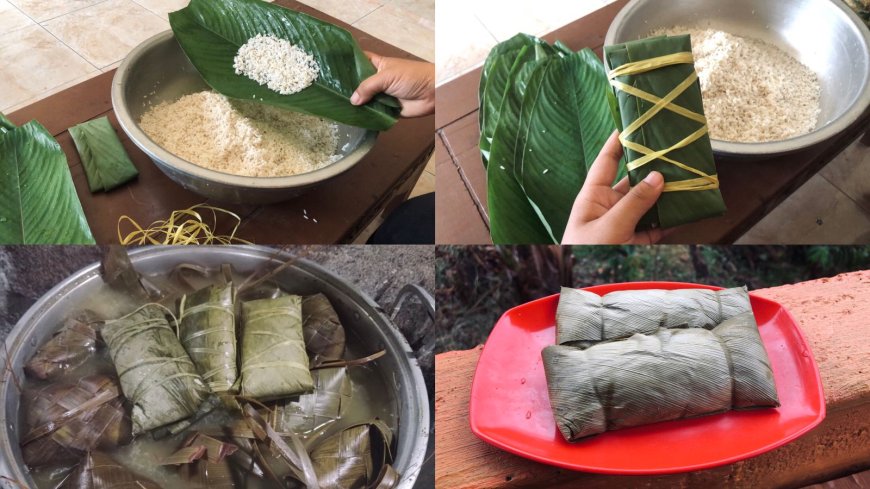
Entil Making Steps (Source: Private Collection)
The method of making Entil is quite simple. This dish is made from rice wrapped in kalingidi leaves and wrapped with kaso-kaso rope. It is cooked by boiling for four to five hours until cooked. Usually, the Entil cooking process does not use a stove, but firewood. Especially coffee wood, which is believed to give the dish a more delicious aroma. The deliciousness of Entil is closely related to the use of kalingidi leaves as a wrapper. These leaves give Entil it’s distinctive green color, which gives it a unique aroma and taste. Even after refrigeration, Entil retains a touch of its distinctive minty flavor. The kalingidi leaves also allow the entil to keep for two to three days.
During Rahina Ulihan, Entil is usually served along with various side dishes such as smoked or jerked pork offal (urutan), fried fish, urab vegetables, shredded chicken, and shaved coconut (saur). Not only Rahina Ulihan, Entil is also used by the people of Pupuan when there is a grief ceremony, to be precise the third day after a person dies or commonly referred to as "nutug katelun". Nutug katelun is performed by visiting the "setra" before 6 am or before sunrise, by bringing "banten" containing Entil. Then, is the meaning of entil here similar to the meaning of Entil during Ulihan?

Nutug Katelun Ceremony (Source: Private Collection)
In contrast to the meaning of Entil during Ulihan, the ancestor who "returns" is purified. With the hope that "ida" leaves armed with purity and returns to bestow purity. During Nutug Katelun, the meaning of entil focuses on the act of purification without expecting the gift of purity in return. In this context, Sang Hyang Numadi, which symbolizes a body with two powers, male and female, is the focus of purification. It is said that the purpose of purification here is so that the "numadi" in the gross body can be accepted to "ngayah" at Prajapati Temple, so that it is free from worldly ties.
Not only that, Entil with its special ingredients and deep philosophical meaning, also has a unique consumption procedure. When opening the rope wrapped around the Entil, we must follow a special procedure by cutting it so that it splits into two parts (it cannot be opened carelessly). Half of the Entil must first be offered as an offering, while the other half can then be enjoyed. Initially, Entil could only be enjoyed in "Pupuan Village" during the Rahina Ulihan celebration which takes place once every six months. However, nowadays the dish has become part of the daily culinary of the people in "Pupuan District", without having to wait for half a year.
So, how about it? Are you interested in trying this traditional dish that is rich in philosophy? If you're visiting the Pupuan District area, don't miss the chance to enjoy Entil. Remember that this dish is exclusive to the Pupuan Region, and you won't find it outside the region. Have fun exploring the rich flavors of Balinese cuisine with the deep meaning offered by Entil Pupuan.

















































